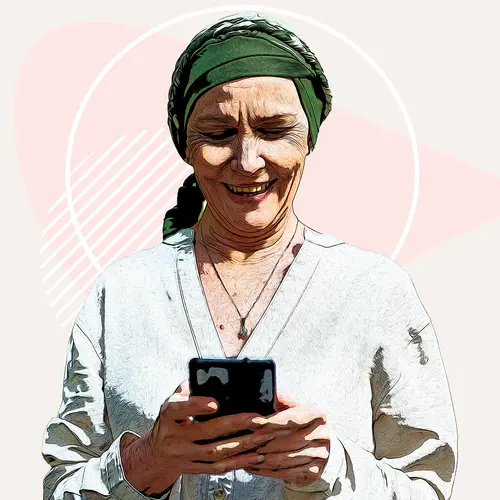By Terlisa Sheppard, as told to Stephanie Watson
It's been 19 years since I was diagnosed with stage IV breast cancer. I'm one of the long-timers. I'm so very grateful for that. Yet I've lost so many friends and family members to this disease along the way. I've been in the hospital with them, holding their hands.
Now I feel compelled to help support others, especially those who are newly diagnosed. I want to do anything I can to help them through their treatment and give them peace of mind.
Two Babies and a Cancer Diagnosis
My cancer journey started in 1998, when I was pregnant with my younger daughter. My older daughter had just turned 2.
I found a lump in my breast. Every time I went to my OB/GYN for my monthly visits, I would tell him about it. For some reason, maybe because I was only 31, he just kept saying, "It's nothing. It's probably clogged milk ducts." His final words to me were, "If you insist, Terlisa, we'll do a mammogram now and we'll do another one after your baby is born and compare the two." We never got to the second mammogram.
My breast surgeon did the biopsy. I had a stage III, triple-positive breast cancer. Because I was 8 1/2 months pregnant, my doctor said I should get induced and have the baby early, and then get treatment. I had aggressive chemotherapy to try to shrink the tumor before having surgery.
Get Your Life in Order
The treatment did stop my cancer, but it was very aggressive. I was in remission for under 2 years. Then I developed pain in my back, which I thought was from lifting my babies. My doctor diagnosed me with a bladder infection, but it didn't go away after a couple of months on medication. My oncologist told me to come in immediately.
My cancer had spread to my bones, lungs, and liver. My doctor said, "Terlisa, this is not good. I need you to go home, quit your job, and get your life in order." I was 34 years old with a 3-year-old and a 5-year-old at home.
2002 was my year from hell. I went on aggressive chemotherapy treatment. I developed a blood clot in my lungs and a low white blood cell count. In one of my worst moments, I had to go to the bathroom but I was too weak to stand up. I remember getting down on the floor and crawling to the bathroom.
I said to myself, "This is the lowest you can get, Terlisa. It's all up from here."
Getting the Most From Your Treatment
I've been on just about every treatment that's available for advanced breast cancer. I had a mastectomy to remove my left breast. Then I did radiation therapy. I took hormone therapy. And I've been on trastuzumab (Herceptin) for years.
One of the first things I tell people who are starting breast cancer treatment is to advocate for yourself and learn all you can about your cancer. Twenty-two years ago when I was diagnosed, none of my friends, family, or co-workers understood my cancer. Neither did I. How could I advocate for myself when I didn't know what to talk about?
There are different subtypes of breast cancer. Make sure you know which one you have so you can get on the right treatment. Do your homework. And absolutely get a second opinion. You don't want to go on doubting, "Should I have done that?"
Anyone who has metastatic cancer knows there's a day in our future when our treatment will stop working. You need to be armed with the next type of treatment that's available based on your subtype. If you go into it blindly, then you're just taking whatever medicine is on the shelf as opposed to the one that works best.
Definitely try to get into a clinical trial. There hasn't been a large percentage of the Black community in clinical trials. How else can we learn about drugs like Herceptin, which saved my life?
What to Do About Side Effects
Breast cancer treatments cause side effects. I don't minimize my side effects, but I try to be as realistic about them as possible. If I mentally let them break me down, then what kind of life am I living?
I went through four different breast cancer diagnoses and treatments, and I lost my hair every time. For some women, that's their glory. They say, "You're taking my breast. Now you're taking my hair." Some women just cannot deal with that.
Cover your hair loss in whatever way makes you most comfortable. I didn't do the wigs. I wore hats and scarves. And I would always dress well and put makeup on to look my best.
I focus a lot on my mental health and on self-care. I go outside and walk. I do yoga. I go to the beach and meditate. These are some of the things I've done for myself over the years, and they have helped.
I love juicing fruits and vegetables. That really helped me when I was diagnosed with a brain metastasis in 2003 because I couldn't eat anything. I started eating again, and I started to feel better about myself.
Finding other people with metastatic breast cancer has also helped me. They get it. They understand. We can joke and talk about things other people might not get.
I'm not afraid of death anymore. Whatever happens, I'm going to focus on living in the moment and doing all I can for myself and for others. I use my situation, and my journey, to educate others.
Most of all, I stay positive. Remaining positive won't cure my cancer, but it can't hurt, either.

